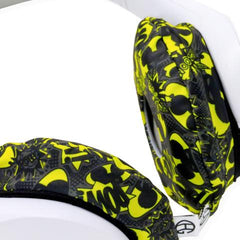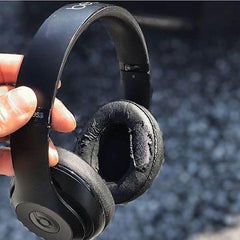Will Listening to Music Help You Workout Harder?

Most of us will plug into a device when we’re exercising. Whether we’re walking, running, lifting, cycling or swimming, it’s never been easier to stream the songs and albums we love from our devices but can music actually help us to workout harder?
If it doesn’t, then why do so many of us slide on our EarHugz, slip on our headphones and start sweating to the beat?
Maybe it’s a self-fulfilling prophecy: if you’re used to a playlist, then working out without one will make it harder to focus. We’ve all felt that gut-punch of arriving at the gym only to realise we’ve forgotten something important: our protein shake, our keycard, our towel, or, for the ladies, our sports bra.
Forget your headphones and you could end up listening to whatever the gym is pumping out of its loudspeakers or WORSE the distance rumblings of Ricky Martin coming from the Zumba class upstairs. The only thing worse than leaving your music at home — surely — is being held hostage to someone else’s mixtape.
On the surface, it seems that music does for exercise what exercise does for mental health: it sharpens our focus and distracts us from the exertion of working out.
Does Music Help You Workout Harder?
Bottom line? Music can increase your performance by up to 15%
Costas I. Karageorghis and David-Lee Priest’s research on The National Centre for Biotechnology Information’s website suggests: “According to the available evidence, music captures attention, raises spirits, triggers a range of emotions, alters or regulates mood, evokes memories, increases work output, heightens arousal, induces states of higher functioning, reduces inhibitions and encourages rhythmic movement – all purposes that have considerable application in the exercise domain.”
Speaking to The Telegraph, Costas Karageorghis, also remarked that when ‘exercising at low to moderate intensity, music can reduce your idea of how hard you have to work.’
Furthermore, hearing music that you associate with ‘peak performance will fire areas of the brain that deal with your long-term memory. It can inspire you and help you shift up a gear.’ So there’s no need to hide Eye of the Tiger on your playlist. If it helped Rocky, then it can help you, too.
FIST PUMP! (Risin' up, back on the street... epic 1980s training montage sold separately).

This is definitely good news, but he goes on to say that whilst music does help, it WON'T make you fitter than you already are. Blasting Chariots of Fire won’t suddenly make Mo Farah out of a park runner BUT it will help distract you from realising how hard you’re working out and — the coolest part — it can help reduce any pain you’re feeling. And so strongly does Karageorghis believe that music can improve physical performance, that he’s quoted in Scientific American as saying that you can think of music as "a type of legal performance-enhancing drug."
But music doesn’t benefit everyone equally. He goes on to differentiate between elite athletes and everyone else, suggesting that the former tend to “associate inwards” when they run, looking for the stimulus within themselves. Whilst the rest of us are more likely to look for the distractions outside ourselves: in music, for example.
Surprisingly though, it isn’t just the clubland bangers we should be downloading as songs with fewer beats-per-minute (BPM) can help with our post-workout recovery. Karageorghis suggests adding songs like Enya’s 'Orinoco Flow' and Ed Sheeran’s ‘Thinking Out Loud’ to help calm us down.
But he warns, too, about the effects of listening to music too often as it can damage your hearing. "During high-intensity interval training, the blood flow to the shell-like part of the inner ear is reduced, which leaves the follicles that pick up the sound more susceptible to damage." It’s an important point to remember. Improving your physical fitness should not come at the expense of your hearing and be careful when working out with in-earphones or earbuds as they generally carry a greater risk of this than headphones.
What Type of Music is Best for Working Out?
The best BPM for cardio appears to be somewhere between 120-140 BPM: this includes songs like Womanizer by Britney Spears, Beat It by Michael Jackson, Bleed it Out by Linkin Park, Hotel California by The Eagles and You Really Got Me by Van Halen.
We should pick our songs based on two factors: tempo and rhythmic response, according to Scientific American. Tempo is the speed of a song and rhythmic response is what happens when we want to move to the music (imagine an over-50 hearing Come on Eileen at a wedding reception). The results of one study found that hip-hop, rock and pop were the most popular types of music to workout to. And that’s certainly reflected in Sony’s top 10 list of songs for weightlifting to, which included:
-
Can’t feel my face by the Weekend
-
Don’t Stop Me Now by Queen
-
Iron Man by Black Sabbath.
Making an Entrance to Music

And it’s not just during exercise that music can benefit our performance. Athletes will often talk about ‘getting into the zone’ before a professional competition. Using music to improve performance is something that headphone manufacturer Beats exploited during the 2012 Olympics when it gave pairs of its headphones to members of the British Olympic Team. It put Beats on the map but the athletes weren’t just wearing them to help the brand sell more product; they wore them to aid their focus, drown out the crowd and mentally prepare themselves for (hopefully) the performance of their lives.
But entrance music isn’t just something that’s for the benefit of an individual athlete. A good track can be used to get a crowd going, to intimidate the other competitor or to increase support for an individual or team. Music is famously used to introduce opponents in sports such as professional darts, MMA and boxing.
Mike Tyson’s entrance music for his fight against undefeated heavyweight champion Mike Spinks in 1998 is described by Pierre Richardson as being “the most intimidating boxing walkout music of all time”. Richardson discusses the choice at length, highlighting something the commentator said at the time:
Whether you love Survivor, Taylor Swift, Paramore, Meat Loaf or the clanging of metal chains (thanks, Mike), music can have a positive impact on your workout, so when you’re striving to be stronger, faster, fitter and better than you were yesterday, remember that music can be a great addition to your routine. And whatever's on your playlist, protect your headphones from moisture damage with EARHUGZ. These sweat-proof covers fit easily over most big brand headphones, are fully reversible, machine washable, anti-bacterial AND £1 from each sale goes to the Mental Health Foundation.




